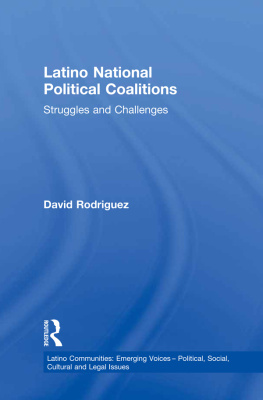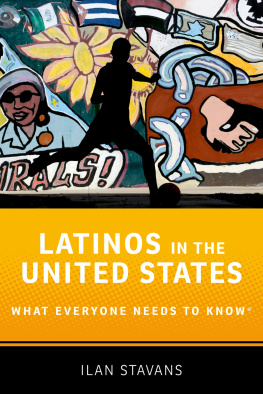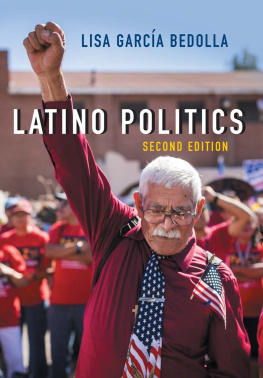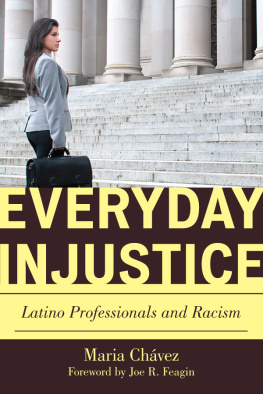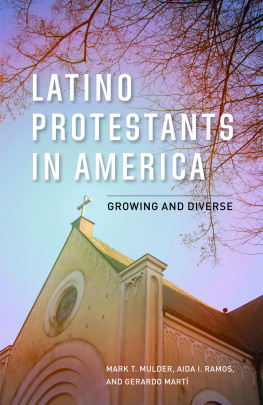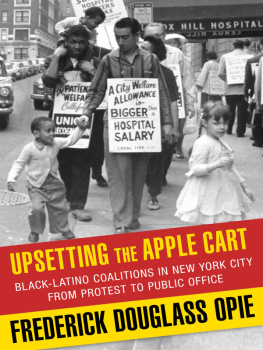Published in 2002 by
Routledge
Taylor & Francis Group
711 Third Avenue
New York, NY 10017
Published in Great Britain by
Routledge
Taylor & Francis Group
2 Park Square
Milton Park, Abingdon
Oxon OX14 4RN
Routledge is an imprint of the Taylor & Francis Group.
Copyright 2002 by David Rodriguez.
All rights reserved. No part of this book may be reprinted or reproduced or utilized in any form or by any electronic, mechanical, or other means, now known or hereafter invented, including photocopying and recording, or in any information storage or retrieval system, without written permission from the publishers.
Library of Congress Cataloging-in-Publication Data
Rodriguez, David.
Latino national political coalitions : struggles and challenges / by David Rodriguez.
p. cm. (Latino communitites)
Includes bibliographical references (p.) and index.
ISBN 0-8153-3370-6
1. Hispanic AmericansPolitics and government. 2. Coalition (Social sciences) 3. Hispanic AmericansSocial conditions. 4. United StatesEthnic relations. 5. United StatesPolitics and government1989 I. Title. II. Series.
E184.S75 R65 2001
323.1168073dc21
2001052024
Latinos are now the largest ethnic minority in the United States with a population of over 35 million people (see U.S. Bureau of Census, 2001). However, Latinos continue to be underrepresented in American politics and continue to experience racial, gender, and class exploitation in society. For Latinos, the 1990s were a nightmare of national anti-Latino sentiment in America that was reflected in the English Only! movement, Californias Proposition 187 anti-immigrant legislation, the anti-affirmative action California Civil Rights Initiative, and various anti-bilingual initiatives and legislation. Moreover, America experienced a resurgence of racism that was found in militia groups and in the persistence of hate groups such as the Ku Klux Klan, Aryan Nations, and various skinhead affiliates (see Dees, 1996). Coupled with the bombings of black churches, Latinos and other minorities experienced great racial anxieties and fears in America.
Historically, Latinos have struggled against discrimination in North America in various ways such as forming political organizations that represented their particular group interests. The early organizations developed along single group lines or national origin groups. For example, Chicanos formed political organizations for Chicanos, Puerto Ricans formed organizations for Puerto Ricans, and so forth. It was not until after the 1960s social movements and new ethnic radicalism that Latino groups attempted to form coalitions that contained a variety of Latino groups or pan-Latino coalitions. These coalitions began to represent Latinos on a national level and started to have some impact on the national political arena. In the process the phenomenon also added to the meaning of coalitions.
Meaning of Coalitions
A coalition, as defined in Websters 9th New Collegiate Dictionary, is the act of coalescing and is a body formed by the coalescing of distinct elements. It is also a temporary alliance of parties, persons, or states for joint action. In the American Political Dictionary, coalitions can also be described as any alliance among political groups (Plano and Greenberg, 1992: 117). Thus, a Latino national political coalition can be defined as an alliance among different Latino subgroups for joint political action.
Since the early 1960s, Latinos have been actively and visibly involved in the mainstream of politics in the United States (Garcia, 1988: ix). Because of their heavy concentration in some areas of the United States they have had an impact on local and statewide elections. Some scholars have studied Latino single group political organizations in American society (see Tirado, 1970). Unfortunately, the political science literature is very limited and dated in the study of coalitions and does not examine Latinos and their experiences with political coalitions. For example, William H. Rikers game theory work in the 1960s on political coalitions does not offer any insights that could be useful in understanding contemporary Latino political coalitions (Riker, 1962). Rikers work is also limited because it is not stated in a way that lends itself to easy measurement (Hill, 1973). Another example could be found in the area of economic or cost-benefit coalition theory which is also closely related to game theory (see Adrian and Press, 1968; De Swaan, 1973). The problem is that it not only excludes an analysis of Latinos, but it does not lead to any operational definitions or hypothesis testing. Still, another example is found on theories based on a social-psychological model (see Gamson 1961 and Chertkoff, 1970) which again excludes Latinos and suffers from the inability to operationalize key concepts that can be measured effectively.
A book published in 1991 on Latinos and political coalitions explored issues such as the media, language policy, the labor movement, and voter mobilization in the context of coalition building (see Villarreal and Hernandez, 1991). However the focus of the book was only on the Chicano coalition experience. No article discussed or analyzed coalitions that were multi-group and that included Chicanos, Puerto Ricans, and Cubans.
More than twenty years ago, Paul Hill wrote, the coalition literature has yet to achieve an integrated vocabulary, a generally accepted methodology, or a consensus on the most useful conceptual framework (Hill, 1973: 6). Today that problem continues to exist and is exacerbated by the exclusion of Latinos in the literature. However, coalition behavior is a fundamentally important element in the political process (Groenings et al., 1970). Coalitions are formed in a variety of ways, from individuals to groups, from parties to elites to nation-states. In many cultures and at many periods of time, coalition behavior has been closely linked to the basic question of who gets what, when, how? In order to achieve their goals, people often find themselves in situations that encourage or require them to form, maintain, or dissolve a coalition (Groenings et al., 1970: 1). Latinos in the United States find themselves in a situation of adversity. As a politically underrepresented people struggling against racial, gender, and class discrimination, Latinos have turned to the formation of national political coalitions.
Research Questions and Scope of Study
Now that Latinos have formed multi-group national coalitions, do these coalitions make a difference in the Latino community? Do these types of organizations better serve the Latino community? Should Latino coalitions function only along a national origins level? Is the Latino community too diverse and complex for successful coalition building?
Latino scholars have argued that political coalitions are strategically important for Latinos who are generally underrepresented and powerless in American politics (Vigil, 1987; Garcia, 1988; Gomez-Quiones, 1990). Forming coalitions with other groups combines resources and increases the political power of coalition members (Garcia and de la Garza, 1977). Coalitions can also promote ethnic consciousness and solidarity (Padilla, 1987: 204).

